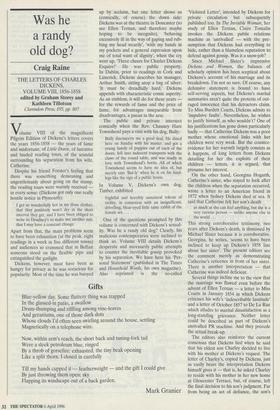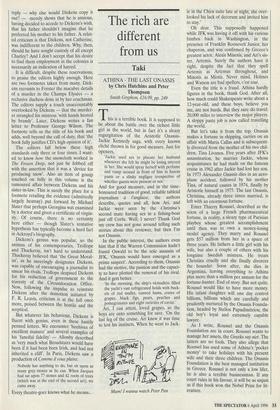Was he a randy old dog?
Craig Raine
THE LE 1 I ERS OF CHARLES DICKENS, VOLUME VIII, 1856-1858 edited by Graham Storey and Kathleen Tillotson Clarendon Press, £95, pp. 807 Vlume VIII of the magnificent Pilgrim Edition of Dickens's letters covers the years 1856-1858 — the years of fame and misfortune, of Little Dorrit, of lucrative and lauded reading tours, of the scandal surrounding his separation from his wife, Catherine.
Despite his friend Forster's feeling that there was something demeaning and ungentlemanly about going on the stump, the reading tours were warmly received in every sense: (Dickens got only one really hostile notice in Plymouth): I get so wonderfully hot in my dress clothes, that they positively won't dry in the short interval they get, and I have been obliged to write to Doudney's to make me another suit, that I may have a constant change.
Apart from that, the main problems seem to have been exhaustion (at the peak, eight readings in a week in five different towns) and audiences so crammed that in Belfast someone stood on the flexible pipe and extinguished the gaslight.
Dickens, however, must have been as hungry for privacy as he was voracious for popularity. Most of the time he was buoyed up by acclaim, but one letter shows us (comically, of course) the down side: Dickens was at the theatre in Doncaster (to see Ellen Ternan, and therefore maybe hoping to be incognito), 'behaving excessively ill in the way of gaping and rub- bing my head wearily', 'with my hands in my pockets and a general expression upon me of total want of dignity', when the cry went up, 'Three cheers for Charles Dickens Esquire!' He was public property. In Dublin, prior to readings in Cork and Limerick, Dickens describes his manager, Arthur Smith, sitting atop a bag of silver. `It must be dreadfully hard,' Dickens appends with characteristic comic asperity. As an emblem, it will do for these years for the rewards of fame and the price of fame, for advantages inseparable from disadvantages, a paean in the arse.
The public and private intersect comically when the Rev. Chauncy Hare Townshend pays a visit with his dog, Bully:
Bully disconcerts me a good deal. He dined here on Sunday with his master, and got a young family of puppies out of each of the doors, fell into indecent transports with the claws of the round table, and was madly in love with Townshend's boots. All of which Townshend seems to have no idea of, but merely says `Bul-ly' when he is on his hind- legs like the sign of a public house.
In Volume V, Dickens's own dog, Timber, exhibited
frightful and horribly unnatural tokens of virility, in connexion with an insignificant, drivelling, blear-eyed little tame rabbit of the female sex ...
One of the questions prompted by this volume is concerned with Dickens's sexual- ity. Was he a randy old dog? Clearly, his malicious contemporaries were inclined to think so. Volume VIII details Dickens's desperate and necessarily public attempts to counter the inevitable gossip provoked by his separation. We have here his 'Per- sonal Statement' (published in The Times and Household Words, his own magazine). Also reprinted is the so-called `Violated Letter', intended by Dickens for private circulation but subsequently published too. In The Invisible Woman, her study of Ellen Ternan, Claire Tomalin invokes the Dickens public relations machine as 'unrivalled' — with the pre- sumption that Dickens had everything to hide, rather than a blameless reputation to defend against gossip. Was it a snow-job?
Since Michael Slater's impressive Dickens and Women, the balance of scholarly opinion has been sceptical about Dickens's account of his marriage and its breakdown. I'm not so sure. Of course, any defensive statement is bound to have self-serving aspects, but Dickens's marital summaries aren't quite the protests of out- raged innocence that his detractors claim. To Miss Burdett Coutts, Dickens admits to `impulsive faults'. Nevertheless, he wishes to justify himself, as who wouldn't? One of his justifications has gone down particularly badly — that Catherine Dickens was a poor mother whose emotional links with her children were very weak. But the counter- evidence for her warmth largely consists as it happens, of long letters from Dickens detailing for her the exploits of their children — letters, it is argued, that presume her interest.
On the other hand, Georgina Hogarth, Catherine's sister, who stayed to look after the children when the separation occurred, wrote a letter to an American friend in 1872 when Sydney Dickens died at sea. It said that Catherine felt her son's death as much as she can feel anything, but she is a very curious person — unlike anyone else in the world ...
This strong corroborative testimony, two years after Dickens's death, is dismissed by Michael Slater because it is corroborative. Georgina, he writes, 'seems to have been inclined to keep up Dickens's 1858 line about her sister'. The present editors see the comment merely as demonstrating Catherine's reticence in front of her sister. There is another interpretation — that Catherine was indeed deficient.
Several things incline me to the view that the marriage was flawed even before the advent of Ellen Ternan — a letter to Miss Coutts in January 1854 in which Dickens criticises his wife's 'indescribable lassitude' and a letter of October 1857 to De La Rue which alludes to marital dissatisfaction as a long-standing grievance. Neither letter could be described as part of Dickens's unrivalled PR machine. And they precede the actual break-up.
The editors also reinforce the current consensus that Dickens lied when he said that his eldest son Charley decided to live with his mother at Dickens's request. The letter of Charley's, copied by Dickens, just as easily bears the interpretation Dickens himself gives it — that is, he asked Charley to reside with his mother in her new home at Gloucester Terrace, but, of course, left the final decision to his son's judgment. Far from being an act of defiance, the son's reply — why else would Dickens copy it out? — merely shows that he is anxious, having decided to accede to Dickens's wish, that his father shouldn't imagine that he preferred his mother to his father. A relat- ed criticism is that Dickens, not Catherine, was indifferent to the children. Why, then, should he have sought custody of all except Charley? And I don't accept that his desire to find them employment in the colonies is necessarily an indication of hatred.
It is difficult, despite these reservations, to praise the editors highly enough. Here are two footnotes taken from many. Dick- ens recounts to Forster the macabre details of a murder in the Champs Elysees — a reclusive duchess done in by her coachman. The editors supply a touch unaccountably overlooked by Dickens — that the murder- er strangled his mistress 'with hands heated by brandy'. Later, Dickens writes a fan letter to Professor George Wilson. The footnote tells us the title of his book and adds, well beyond the call of duty, that 'the book fully justifies CD's high opinion of it'.
The editors fall below these high standards only three or four times. I want- ed to know how the snowcloth worked in The Frozen Deep, not just be fobbed off with the assertion that it was a 'device for producing snow'. Also an item of gossip touched on fully in this volume is the rumoured affair between Dickens and his sister-in-law. This is surely the place for a footnote retailing the evidence (admittedly largely hearsay) put forward by Michael Slater that perhaps Georgina was examined by a doctor and given a certificate of virgin- ity. Of course, there is no certainty here either — though Slater's tentative hypothesis has typically become a hard fact in Ackroyd's biography.
Dickens's genius was popular, so the animus of his contemporaries, Trollope and Thackeray, isn't hard to understand. Thackeray believed that 'the Great Moral- ist', as he sneeringly designates Dickens, was capable of encouraging a journalist to smear his rivals. Trollope despised Dickens for his reduction of government to the travesty of the Circumlocution Office. Now, following the impulse to reinstate Dickens after the demotion initiated by F. R. Leavis, criticism is at the full once more, poised between the hostile and the sceptical.
But whatever his behaviour, Dickens is fluent with genius, even in these hastily penned letters. We encounter 'beehives of excellent manure' and several examples of his 'fanciful fidelity' — Allonby described as 'very much what Broadstairs would have been if it had been born Irish, and had not inherited a cliff. In Paris, Dickens saw a production of Comme it vous plaira:
Nobody has anything to do, but sit upon as many grey stones as he can. When Jacques had sat upon 77 stones and 42 roots of trees (which was at the end of the second act), we came away.
Every theatre-goer knows what he means..



























































 Previous page
Previous page